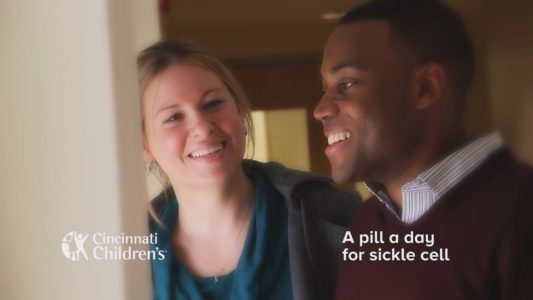Taking a beautiful new baby home from the hospital is a cherished experience, but for approximately 20 families in the Cincinnati area each year, a simple phone call significantly changes those first few days at home. The call comes from the Cincinnati Children’s Comprehensive Sickle Cell Newborn Screening program, which identifies newborn babies who have sickle cell disease – a complicated lifelong blood disorder.
Sickle cell disease (SCD) is an inherited blood disorder that affects red blood cells – which carry oxygen throughout the body and are normally round and shaped like a disc. With SCD these blood cells are sticky and abnormally crescent or hook-shaped, causing them to clog the blood vessels, block oxygen, and cause complications such as pain, anemia or strokes.
Sickle cell disease is inherited with a gene from each parent. Babies that only inherit a gene from one parent are born with sickle cell trait. All newborns in the US are tested for sickle cell disease and sickle cell trait at birth through newborn screening programs like the one here. Both the disease and the trait can affect people of African, Mediterranean, South and Central American, Caribbean, and Middle Eastern descent. In addition to the 20 or so babies who are born with SCD in southwestern Ohio each year, approximately 600 babies are identified with sickle cell trait. Sickle cell trait is not SCD, but it is important for individuals to know their trait status so they can make informed decisions about having children later in life.
A sickle cell disease diagnosis can be devastating to families as they face a long, unpredictable road of medical appointments, hospitalizations and complications. The Comprehensive Sickle Cell Center at Cincinnati Children’s has a dedicated team of physicians, nurses, social workers, school intervention coordinators, and psychologists to help make that road easier.
Cincinnati Children’s is a national leader in treating SCD and has a robust research history as one of ten Sickle Cell Centers funded by the National Institute of Health. Dr. Marilyn Gaston led a landmark study here in the 1980’s that found significant benefit in giving a daily dose of penicillin to babies with sickle cell disease. This one simple change in care has saved countless lives in the last several decades by reducing the occurrence of fatal infections among babies with the disease.
The Comprehensive Sickle Cell Center at Cincinnati Children’s is proudly carrying on the tradition of leading research and exceptional clinical care. Dr. Punam Malik, director of the center, is going to lead the gene therapy study that laboratory tests show has the potential to cure sickle cell disease. FDA approval is pending and the first adult may be enrolled in this groundbreaking study in 2013. The center also treats over 300 pediatric patients with sickle cell disease, utilizing study breakthroughs to provide the most up-to-date clinical care available.
As we recognize Sickle Cell Awareness Month, we hope you will learn what you can about SCD and if you know someone who is living with or has a child with SCD, this is a great time to send a quick note or perhaps offer to help alleviate some stress for them somehow. It’s also an excellent time to consider supporting research programs that are working tirelessly to find a cure.






hello my daughter for 5 years from the birth of an unknown blood disorder called tevadavisi 15 days or 30 days there is continuous blood supplement would be glad if you help me